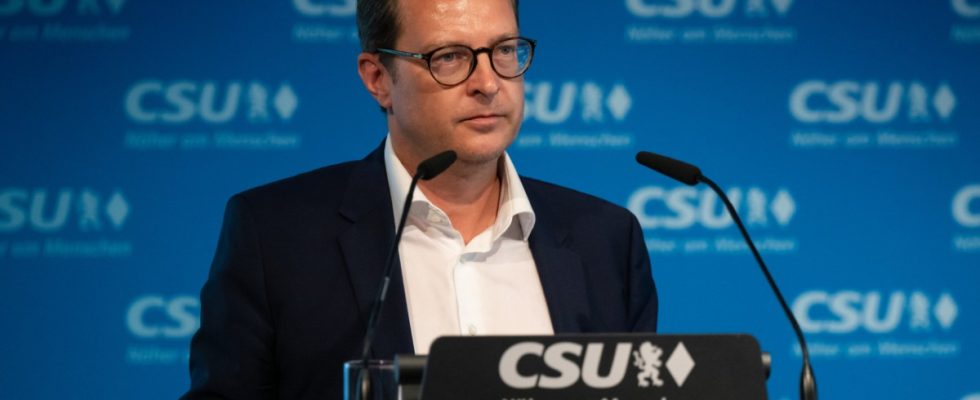When the smart young people come into the hall of the CSU state leadership, the news is already on the journalists’ desks: the draft for the new policy program, entitled: “For a new togetherness.” Secretary General Martin Huber, as well as Anja Weisgerber, member of the Bundestag, and Gerhard Hopp, member of the Landtag, as chairmen of the Policy Commission, will present the paper for the first time on Friday: 90 stapled pages, not yet nicely bound. It is to be finally decided at the party conference in May.
In February 2022, party leader Markus Söder announced that a new program would be drawn up before the state elections. By, as he said, “smart young people”. It is important to redefine the Christian image of man in the C and to show a balance between cosmopolitanism and a bond of values. And that’s what the trio Huber, Hopp and Weißgerber, all in their fifth decade, now believe they have achieved. Huber speaks of a “determination of one’s position as a bourgeois-conservative force” – anchored in the Christian image of man and consistent reference to Liberalitas Bavariae, motto “live and let live”.
It is the eighth program since 1946, the last one was in 2016. That commission was headed by the then General Markus Blume, now Minister of Science. Theo Waigel, Alois Glück and Manfred Weber were also responsible for the basic program – which of course does not have to say anything about the career options of the three now responsible. What’s new? It’s “more of an evolution,” says Huber, an update, it’s “not that we threw everything overboard.” Your principles have deceived the CSU for decades, the question is: “What do these principles mean today?” And “the more stormy the times are, the more I need a compass” – this has now been readjusted. After all, who would have thought of the pandemic in 2016, of war in Europe, of “all these things that show how vulnerable we are”?
By the way, that’s not entirely true with program number eight, there was still a ten-point declaration in 1945. Tenor: “Rebuilding what has been destroyed with the diligence of our hands and the strength of our hearts.” Well, anyone who listens to the furor of the CSU against the traffic light, according to which the federal government is ruining the country, would have to think: A similar passage would be found in the new work. That’s not the case. However, there is no lack of references to traffic lights.
The traffic light tells people how to wash themselves, says Huber
Only the CSU people’s party has the power to “connect issues and people and hold the country together,” says Huber. Don’t play anyone off against each other. The traffic light does the opposite, “with gender ideology, wokeness and cancel culture”, with “bans and renunciation”, with “collectivist approaches”. This results, for example, in the fact that one is no longer allowed to name things that are taken for granted, that there are regulations as to what one has to eat or how one has to wash oneself.
A look at the new policy. When it comes to climate protection, social and economic issues must also be considered. The CSU propagates love of one’s homeland as “enlightened patriotism”, wants to limit migration, “there is no human right to free entry”. Regarding energy: “Only switching off and getting out means the deindustrialization of Germany.” On the subject of finances: Earning must come before distribution, and things must be clean, unlike in the “shadow budgets” of traffic lights. Example gay marriage, which was introduced after the basic program of 2016 – the CSU could hardly go behind the current law. Weißgerber complains that the traffic light “completely blurs the concept of family”. However, the paper pays tribute to “all forms of living together”, same-sex partnerships are even listed in the same sentence as mother-father-child families or patchwork models.
Weißgerber sees the program as “a positive awakening story for our country”, supported by the “model of a solidarity-based meritocracy”. Hopp reports that the commission, with its 62 members, covers the entire CSU, all parliamentary levels down to the volunteer base. Debates were held with citizens in open events and associations were involved.
The question remains: where is Söder in the presentation of the future compass? The CSU boss is on the way. According to the schedule somewhere between Mühldorf and Mittenwald, from an innovation project to a meeting of rural women. Söder, explains Huber when asked, gave the impetus and found the presentation by the commission management to be “a nice format”; that shows appreciation. But don’t worry: Söder got involved. “And he read that, not that you think…”

